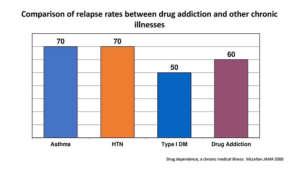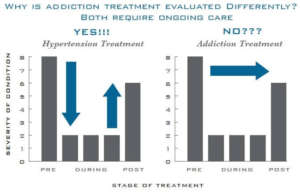We all know the dark place many of our family and friends have fallen into when it comes to substance abuse. Especially recently, with various drug epidemics around the country, so many of our loved ones have fallen victim to addictions. But is their hope? Does treatment for drug and substance abuse show any long-term success? Well, it seems recent studies have answered this question, showing incredible efficacy along the lines of other medically chronic disease treatments.
Firstly, however, we should define what the successful treatment of chronic diseases is. Typically, the goal is not just to cure or manage the condition in the short-term but also to facilitate the long-term healing and rectification of the patient. In the case of drug and substance abuse treatment, the goal is not just to stop further drug-seeking but also to return the patient to be productive and functioning members of their family, community, and society.
In our society, successful treatment of an addict completing detox or similar programs means free of relapse or need of additional care afterward. But why? These are expectations not shared with other chronic diseases or conditions, and with good reason. How does substance abuse treatment compare to the relapse rates for different kinds of chronic condition treatments? Let us compare with some common ones: Type 1 Diabetes, Hypertension, and Asthma.

Each of these diseases causes physical distress and emotional strain to the person and their loved ones and requires ongoing care for the best mitigation. Viewed through the lens of chronic disease, medication-assisted drug or substance abuse treatment shows the same or better relapse rates as compared to the medical treating of those suffering from other chronic diseases, proving addiction treatment does work.

According to the government agency, the National Institute of Drug Abuse, or NIDA, medication-assisted drug treatment programs can produce the following results:
Reduce drug use by 40% to 60%
Reduce arrests for criminal acts by 40%
Reduce criminal behavior by 50%
Increases the prospects of employment by 40%
But like any chronic illness, the best results are further achieved with ongoing care. The Office of National Drug Control Policy’s Treatment Protocol Effectiveness Study found that drug treatment programs work when “those who abuse drugs can be engaged and retained in treatment…”. Many often lose hope when a loved one relapses, but relapse can be significantly reduced with effective treatment and ongoing care.
Therefore, the optimum approach in choosing a quality treatment facility that best achieves our previously stated goals is not in arbitrary metrics such as completion rates, after-treatment sobriety rates, client interviews, and others. The best way to judge the efficacy of a treatment facility and its programs is in the actual quality of care a facility provides, both during and especially after the formal treatment period. One indication of great after-treatment care is an alumni program that allows program graduates to stay involved for years to come and provides accountability in a supportive recovery community.
For information on treatment and finding quality care facilities for you or a loved one, please call (855) 923-1058, and a recovery expert will confidentially guide you to the right path of recovery.
#MAT #Treatments #Support

